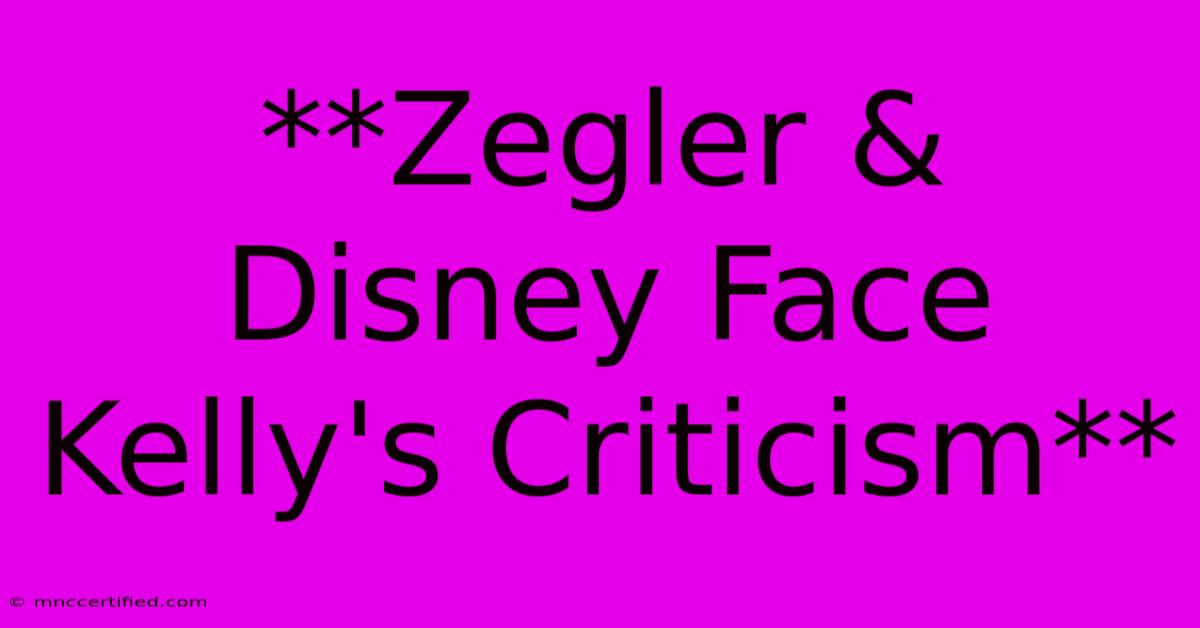**Zegler & Disney Face Kelly's Criticism**

Table of Contents
Zegler & Disney Face Kelly Clarkson's Criticism: A Deeper Dive
The recent Disney live-action adaptation of The Little Mermaid has stirred up a storm of controversy, with actress Halle Bailey facing criticism for her casting as Ariel. While the discussion surrounding the film has centered on the casting choice, the situation has also brought Rachel Zegler, star of the upcoming Snow White live-action remake, into the spotlight.
This article will delve into the criticism faced by Zegler and Disney, examining the root of the controversy, and exploring the potential implications for both the actress and the film industry.
Kelly Clarkson's Comments and the "Snow White" Backlash
The controversy began with Kelly Clarkson, renowned singer and talk show host, who voiced her opinion about the casting of Snow White. Clarkson expressed her concern that the character's traditionally fair skin and features might not be accurately represented in a diverse casting.
Her comments sparked a chain reaction, triggering a wave of criticism directed towards both Zegler and Disney.
The Roots of the Criticism: Examining the Cultural Debate
The criticism surrounding Zegler's casting highlights a complex debate within the film industry and society at large. This debate is centered around the intersection of representation, inclusivity, and the adaptation of beloved classic stories.
Some critics argue that changing the ethnicity of iconic characters undermines the source material and its cultural significance. They argue that the adaptation should remain faithful to the original story and its characters, even if it means sacrificing diversity.
However, supporters of diversity in casting emphasize the importance of representation for all individuals. They believe that casting a Latina actress like Zegler as Snow White can inspire young girls and demonstrate that fairy tales can be inclusive and reflect the diversity of the real world.
Navigating the Controversy: Balancing Legacy and Change
The Snow White controversy has placed Zegler in a challenging position. She faces the difficult task of balancing the expectations of fans who are nostalgic for the original film with the desire for a more inclusive and representative adaptation.
Zegler's response has been measured and thoughtful, acknowledging the criticism and reaffirming her commitment to the role. She has stressed the importance of bringing her own unique perspective to the character and reimagining the story in a way that is both respectful of the original and relevant to contemporary audiences.
The Future of Disney Adaptations: A Turning Point?
The controversy surrounding Snow White serves as a reminder of the ongoing dialogue surrounding inclusivity and representation in Hollywood. While the debate may be heated, it is crucial to acknowledge the need for critical discussion and engagement.
The future of Disney adaptations may be impacted by this controversy, as the company navigates the delicate balance between honoring the past and embracing the future. This conversation about diversity and representation will likely continue to shape the casting decisions and creative choices of the film industry for years to come.
In conclusion, the criticism faced by Zegler and Disney highlights the complexities of adapting classic stories in a contemporary world. The debate surrounding representation and inclusivity is not likely to disappear anytime soon, and the choices made by studios and filmmakers will continue to be scrutinized and debated.

Thank you for visiting our website wich cover about **Zegler & Disney Face Kelly's Criticism**. We hope the information provided has been useful to you. Feel free to contact us if you have any questions or need further assistance. See you next time and dont miss to bookmark.
Featured Posts
-
Can You Insure An Unregistered Car
Nov 15, 2024
-
Argentina Player Ratings Messi Dimmed Vs Paraguay
Nov 15, 2024
-
Tate Mc Rae Drops New Album So Close To What 2025
Nov 15, 2024
-
Refunding Bond And Release Form Nj
Nov 15, 2024
-
The Onion Acquires Infowars At Auction
Nov 15, 2024